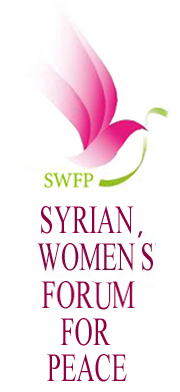Women Activists Strategize to Address Ongoing Challenges for Syrian Women and Children
Posted on: July 12, 2013, by : Editor July 12, 2013 – Seventeen Syrian women activists and gender experts convened from May 9th – 10th in Lebanon to participate in “Gender Challenges in the Transitional Period of Syria,” a workshop organized by the Syrian Women’s Forum for Peace, in partnership with Karama and Hivos. The workshop aimed to define the gender challenges faced by Syrian women in the transitional period and design a work plan to address these challenges.
July 12, 2013 – Seventeen Syrian women activists and gender experts convened from May 9th – 10th in Lebanon to participate in “Gender Challenges in the Transitional Period of Syria,” a workshop organized by the Syrian Women’s Forum for Peace, in partnership with Karama and Hivos. The workshop aimed to define the gender challenges faced by Syrian women in the transitional period and design a work plan to address these challenges.
To kick off the workshop, Dr. Mouna Ghanem discussed Syrian women’s status before the revolution—which she described as lagging behind other Arab countries due to the strictness of Assad’s regime in implementing discriminatory laws—and emphasized the threat now faced by women and girls due to the emerging Salafi idealogy that has come to prominent play in Syrian politics.
Over two days and four sessions, participants analyzed the situation of Syrian women and measured this against the articles of key international conventions, particularly the Convention on the Elimination of all forms of Discrimination Against Women (CEDAW) before and during the Syrian revolution. Participants to the workshop used the SWOT analysis to present the strengths and weaknesses of the Syrian women’s movement and to highlight the main challenges facing the movement as well as the main opportunities that could be leveraged. They also discussed further the situation of Syrian refugees and challenges to women’s participation in state-building and decision-making.
Syrian women have been engaged throughout the uprisings in Syria, from standing on the front lines of violent and risky protests to leading dialogues and galvanizing action through social media. They have also felt the disproportionate punishment for their actions in detainment, torture and assault.
In particular, refugees have faced isolation, marginalization and violence, even in refugee camps. In Lebanon, 70-80 percent of Syrian refugees are made up of women and children, Ms. Sabah Al Hallak shared on the second day of the workshop. Many of these refugees face sexual harassment in public places, such as where they obtain their assistance coupons. Moreover, Syrian children living over the border face schooling challenges in Lebanon as most do not speak the language, a situation Islamic groups took advantage of, opening unlicensed schools, which many Syrian parents enrolled their children at for lack of better options.
Furthermore, Dr. Juli Khouri brought up the added problem of different schools teaching non-uniform, non-Syrian curricula e.g. the Libyan curricula in Alepo and the Qatari one in Al Ghuta, suggesting that in some ways, these educational challenges mark the beginning of the division of Syrian identity.
One of the largest challenges overall is ongoing violence and discrimination against women that carries over from before the revolution and has been exacerbated by situations of conflict and chaos that have pushed many to flee and live as refugees in the region, or to remain under threat and exposed daily to the risk of violence within Syria. Dr. Marselena Hasan Shaa’ban spoke in the final session, advocating for a scientific approach to control violence against women in the context of religious dialogue, which is simple and easily accepted by people.
Participants agreed that the growing threat of religious conservatism guiding political changes in Syria is looming and large. Ms. Al Hallak concluded her presentation by saying that “the Islamic groups are professional and well organized as they are offering to refugees what we are not able to offer. Moreover, the Islamic dialogue is well heard and accepted compared to the secular one.” However, they disagreed regarding how to address this. Some advocated for the need to bring together the civil and religious dialogue, so civil ideology does not seem to be in direct opposition to religious values. Others deemed this unfeasible on the ground.
As a result of the workshop and SWOT analysis conducted, participants delivered a list of short and long-term strategies in addressing key opportunities and threats facing Syrian women and the population at large. Early proposals aimed at engaging and gaining support of regional and international stakeholders; pressuring Syrian political parties to adopt the demands of the women’s movement and enhance women’s role in politics; networking with secular and democratic authorities to guarantee secularity in a new Syrian State; promote national policies and protections that reinforce and enumerate the rights of violence victims and protect their interests and participation in decision-making bodies; and push for government commitment to the return and placement of Syrian refugees.
Participants also emphasized empowerment of Syrian women and political activists and cooperation among members of Syria’s women’s movement as a crucial means for moving forward and lobbying effectively.
The crisis in Syria has been ongoing since early 2012, leaving over 100,000 Syrians dead, including over 6,000 children. Estimates for Syrian refugees living in Lebanon top one million.
